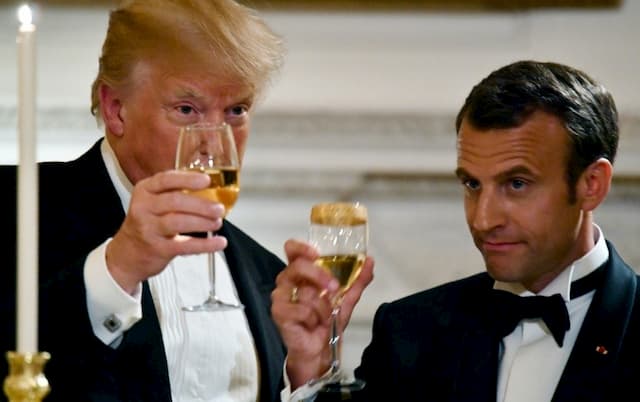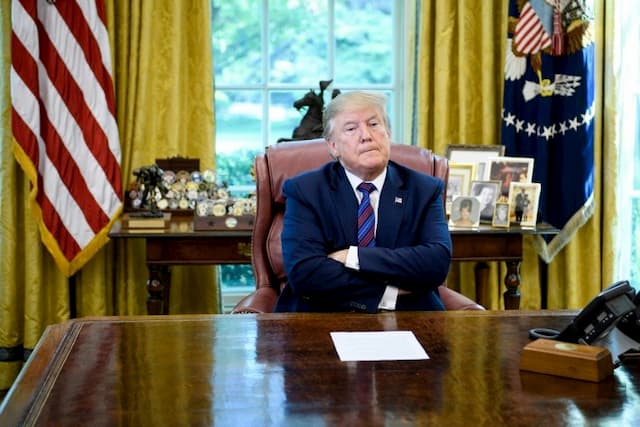Donald Trump Threatens to Tax French Wine in Retaliation for GAFA Tax

Donald Trump denounced “stupidity” Emmanuel Macron and threatens to tax French wine in retaliation for the GAFA tax on the digital giants.
Donald Trump stepped in on Friday 26th July 2019 against France and its tax on the US digital giants denouncing “the stupidity” of President Emmanuel Macron and threatening to retaliate the French wine, one of the most iconic export products of France.
“France has just imposed a digital tax on our major US technology companies. If someone were to tax them, it should be their home country, the United States, “the US president tweeted.
France just put a digital tax on our great American technology companies. If anybody taxes them, it should be their home Country, the USA. We will announce a substantial reciprocal action on Macron’s foolishness shortly. I’ve always said American wine is better than French wine!
— Donald J. Trump (@realDonaldTrump) 26 July 2019
“We will soon announce a substantial reciprocal action after Macron’s stupidity. I always said that American wine was better than French wine! Added the White House host, who does not drink alcohol.
“I’ve always preferred American wines to French wines even though I do not drink wine. I like their appearance. American wines are great, “the Republican billionaire from the Oval Office said Friday.
Read also: The “Gafa tax” validated by the Senate to impose the digital giants
“A subject of common interest” and not only French
The White House announced in the evening that MM. Trump and Macron spoke by phone during the day, adding that they had mentioned the French tax on the digital giants, but without specifying whether French wines were on the menu of discussions between the two leaders.
The Elysee said on Saturday that Emmanuel Macron insisted in this interview that Gafa taxation was “a subject of common interest” and not only French, “on which we must continue to act with a view to obtaining a broad international agreement “.
The G7 summit in Biarritz (south-eastern France) from 24 to 26 August will be “an important opportunity to move forward” on this issue, the presidency said, adding that the talks also focused on ‘Iran.
A little earlier, the Minister of Economy Bruno Le Maire had said that “France will implement (it) its national decisions”.

The French Parliament had definitively adopted on 11 July the introduction of a tax on the digital giants, making France a pioneer country in the imposition of “Gafa” (acronym for Google, Amazon, Facebook and Apple ) and other multinationals accused of tax evasion.
The Trump administration had announced the day before that decision that it was launching a survey to measure the effects of such a tax on US companies.
Then, at the G7 in France two weeks ago, Paris and Washington seemed to reduce their litigation, finance ministers then talking about progress towards a global agreement on the taxation of digital.
“The universal taxation of digital activities is a challenge that concerns us all. We want to reach an agreement on this subject in the framework of the G7 and the OECD “, said Friday Bruno Le Maire.
“Political tools”
This unilateral decision “demonstrates the lack of commitment of France in the ongoing negotiations with the OECD,” however said Friday from Washington a White House spokesman, Judd Deere.
“The Trump administration has always said it will not sit back and tolerate no discrimination against US companies.”
The US Trade Representative (USTR) has already launched an investigation into the possible effects of this tax, he said. And, the Trump administration “looks closely at all the other political tools,” he said.
The Gafa tax creates a tax on large companies in the sector not on their profit, often consolidated in countries with very low taxes like Ireland, but on turnover, pending a harmonization of rules at the level of OECD.
Earlier, the White House’s chief economic advisor, Larry Kudlow, called the tax “a very, very big mistake.”
“We are not happy that France has gone ahead with this kind of tax on digital.”
The Gafa tax imposes these companies up to 3% of the turnover achieved in France including targeted online advertising, the sale of data for advertising purposes and the linking of Internet users by the platforms.
This solution is intended to be only temporary pending the outcome of international negotiations.
Enjoyed this? Get the week’s top France stories
One email every Sunday. Unsubscribe anytime.


